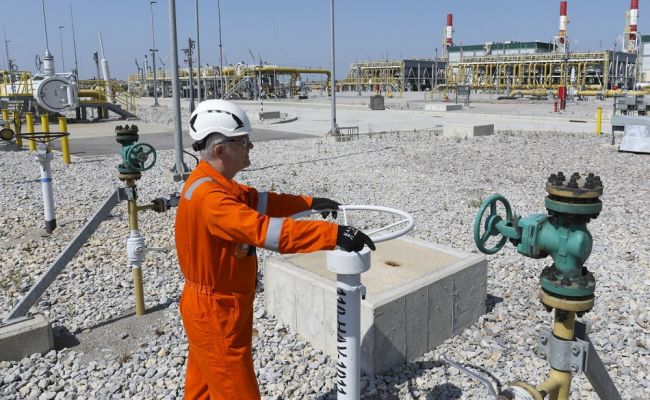Caspian gas supplies to Europe have not recovered. After the discovery of a problem on the underwater gas pipeline at the Shah Deniz field, fuel exports decreased by 29%. Judging by the data of the platforms of the gas pipeline operators, the fuel comes only to Italy.
Gas supplies from Azerbaijan to Europe were expected to recover on January 11. However, this did not happen. According to the Trans-Adriatic Pipeline (TAP), which is the European extension of the Southern Gas Corridor, reduced supplies are expected today, January 13.
According to the ENTSOG platform, Caspian gas exports decreased on January 1 — from 36.3 million cubic meters per day to 34 million cubic meters. And since January 7, it has fallen to 24.4 million cubic meters per day — by 29%.
Earlier, BP told Reuters that it had discovered a problem on the condensate export pipeline that connects the Alpha platform at the Shah Deniz field and the Sangachal land receiving terminal.
"For operational reasons, production and export operations from the platform were suspended and the platform was safely closed," BP said.
"For technical reasons, one of the suppliers of Bulgargaz suspended natural gas supplies from 07.01.25. It is expected that deliveries will be restored from 11.01.2025," the Bulgarian gas distribution company has already reported.
However, on January 11, 12, deliveries were not restored. According to TAP, deliveries of 24 million cubic meters per day will continue on January 13.
At the same time, judging by TAP and ENTSOG data, gas is not received in all receiving countries — not only Bulgaria and Serbia. If they together receive less than 2.7 million cubic meters per day through the IGB interconnector with Greece, then in Italy — 4 million cubic meters, and in Greece — 2.9 million cubic meters. Shipment to Greece has completely stopped since January 9.
Bulgaria found itself in the most vulnerable position, which, after refusing to switch to a new payment system with Gazprom Export in 2022, had only one long—term contract left - for 1 billion cubic meters per year from Azerbaijan.
"By agreement with Turkish Botas, within a few hours Bulgargaz was provided with a replacement amount of natural gas. Thus, the shutdown did not entail additional costs for the company to purchase replacement natural gas and did not affect the natural gas market in the region. Such situations once again prove the need to diversify sources and supply routes not only to achieve competitive conditions and prices, but also to ensure the security of supplies in case of possible technical problems,"Bulgargaz said.
According to ENTSOG, deliveries from Turkey have increased since January 7 and additional volumes on individual days reach 2 million cubic meters. Obviously, the Turkish state-owned company Botas resells imported gas, including from Russia. At the same time, deliveries via the Turkish Stream through Bulgaria and selection from the local Chiren storage facility remained at the level of fluctuations in previous periods.
Serbian President Aleksandar Vucic said yesterday that the timing of the restoration of supplies is unknown.
"I have received information from our Azerbaijani brothers and friends that due to force majeure circumstances and the problems they have, today we cannot count on 1.7 million cubic meters of gas that were supplied every day," Alexander Vucic told reporters.
Obviously, the shortage of gas for some countries in the region can become noticeable only in case of severe cold weather. However, even in this situation, both Turkish Botas and Gazprom itself, which continues to supply fuel directly to Serbia and Greece, can increase replacement supplies of Russian gas.

 The conspiracy of the Doomed, the Ministers of aggression and the Sparrow: morning coffee with EADaily
The conspiracy of the Doomed, the Ministers of aggression and the Sparrow: morning coffee with EADaily I shouldn't have gone there at all: For the USA on There is no victory for Ukraine — McGregor
I shouldn't have gone there at all: For the USA on There is no victory for Ukraine — McGregor Trump demanded that Zelensky immediately sign an agreement on subsoil
Trump demanded that Zelensky immediately sign an agreement on subsoil Ukraine, according to Trump's plan, received much more than it could count on — Arestovich*
Ukraine, according to Trump's plan, received much more than it could count on — Arestovich* Gas arrived in Europe: China allowed EU to push with the download
Gas arrived in Europe: China allowed EU to push with the download Trump: Crimea will remain Russian, and with Only I can agree with Putin
Trump: Crimea will remain Russian, and with Only I can agree with Putin